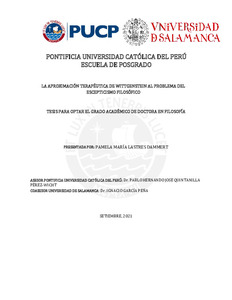| dc.contributor.advisor | Quintanilla Perez Wicht, Pablo Hernando Jose | |
| dc.contributor.advisor | García Peña, Ignacio | |
| dc.contributor.author | Lastres Dammert, Pamela María | |
| dc.date.accessioned | 2022-01-10T15:51:21Z | |
| dc.date.available | 2022-01-10T15:51:21Z | |
| dc.date.created | 2021 | |
| dc.date.issued | 2022-01-10 | |
| dc.identifier.uri | http://hdl.handle.net/20.500.12404/21227 | |
| dc.description.abstract | La tesis estudia en qué consiste el tratamiento terapéutico del escepticismo filosófico en la obra
tardía de Wittgenstein. Presenta la terapia (θεραπεία) como un ejercicio reflexivo sobre la vida y
mantiene que Sócrates, Sexto Empírico y Wittgenstein conciben a la filosofía como una práctica
vital transformadora. Así, la dimensión terapéutica resulta indesligable de un cometido ético. La
tesis argumenta que la terapia psicoanalítica de Freud sirve a Wittgenstein para modelar su propia
concepción terapéutica de la filosofía y sugiere que en ambos casos se trata de una terapia verbal
«curativa» que vincula lenguaje y acción.
Mediante el desmantelamiento del argumento cartesiano del sueño, la tesis muestra que la
respuesta combativa de Wittgenstein al escepticismo radical o filosófico —anclada en las prácticas
corrientes— comparte rasgos importantes con las posturas de los filósofos pragmatistas Peirce y
James. Mientras con Peirce la coincidencia se presenta en los argumentos mismos contra el
escepticismo filosófico, con James la afinidad es metodológica.
La tesis defiende una lectura terapéutica moderada, combativa y no quietista de la obra del
segundo Wittgenstein. En esta lectura la clarificación filosófica propicia una clarificación
existencial. Concluye que clarificar el problema moderno del escepticismo filosófico supone para
Wittgenstein mostrar cómo afecta la comprensión que el filósofo tradicional tiene del mundo y de
sí mismo. | es_ES |
| dc.description.abstract | The dissertation studies the therapeutic treatment of philosophical skepticism in the late
Wittgenstein. It claims that therapy (θεραπεία) is a reflexive exercise about life. In the tradition of
Socrates and Sextus Empiricus, Wittgenstein understands philosophy as a vital transformative
practice. The therapeutic aspect of philosophy is tied to an ethical project. The dissertation also
proposes that Freud´s psychoanalytical therapy is the departure point for Wittgenstein´s own
therapeutic concept of philosophy. It suggests that both authors conceive a verbal therapy with
«curative» goals that links language and action.
The dissertation dismantles the Cartesian argument of the dream in order to show that
Wittgenstein´s combative answer to radical philosophical skepticism —anchored in the current
practices— shares certain features with the ideas of the pragmatist philosophers Peirce and
James. The affinity with Peirce´s ideas lays in the arguments against philosophical skepticism,
while the affinity with Jame´s ideas is methodological.
The dissertation proposes a moderate therapeutic reading, belligerent rather than quietist, of the
work of the late Wittgenstein. In this interpretation, philosophical inquiry propitiates an
existential insight. In concludes that for Wittgenstein, the clarification of the modern problem of
philosophical skepticism implies showing the way it affects the understanding that the traditional
philosopher has of himself and the world. | es_ES |
| dc.language.iso | spa | es_ES |
| dc.publisher | Pontificia Universidad Católica del Perú | es_ES |
| dc.rights | info:eu-repo/semantics/openAccess | es_ES |
| dc.rights.uri | http://creativecommons.org/licenses/by-nc-sa/2.5/pe/ | * |
| dc.subject | Wittgenstein, Ludwig, 1889-1951--Crítica e interpretación | es_ES |
| dc.subject | Escepticismo | es_ES |
| dc.subject | Psicoanálisis y filosofía | es_ES |
| dc.title | La aproximación terapéutica de Wittgenstein al problema del escepticismo filosófico | es_ES |
| dc.type | info:eu-repo/semantics/doctoralThesis | es_ES |
| thesis.degree.name | Doctor en Filosofía | es_ES |
| thesis.degree.level | Doctorado | es_ES |
| thesis.degree.grantor | Pontificia Universidad Católica del Perú. Escuela de Posgrado | es_ES |
| thesis.degree.discipline | Filosofía | es_ES |
| renati.advisor.dni | 10276870 | |
| renati.advisor.orcid | https://orcid.org/0000-0003-4588-3188 | es_ES |
| renati.advisor.orcid | https://orcid.org/ 0000-0001-7227-9758 | es_ES |
| renati.author.dni | 09340768 | |
| renati.discipline | 223038 | es_ES |
| renati.juror | Krebs Pacussich, Víctor Jorge | es_ES |
| renati.juror | Quintanilla Pérez Witch, Pablo Hernando José | es_ES |
| renati.juror | Villanueva Chigne, Eduardo | es_ES |
| renati.juror | Vargas Delia Casa, Rosa Elvira | es_ES |
| renati.juror | García Peña, Ignacio | es_ES |
| renati.level | https://purl.org/pe-repo/renati/level#doctor | es_ES |
| renati.type | https://purl.org/pe-repo/renati/type#tesis | es_ES |
| dc.publisher.country | PE | es_ES |
| dc.subject.ocde | https://purl.org/pe-repo/ocde/ford#6.03.01 | es_ES |






